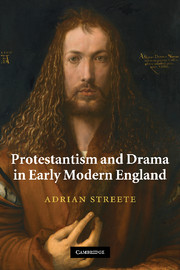Book contents
- Frontmatter
- Contents
- Acknowledgements
- Introduction
- PART I
- 1 Christ, subjectivity and representation in early modern discourse
- 2 Locating the subject: Erasmus and Luther
- 3 Representing the subject: Calvin, Christ and identity
- 4 Perception and fantasy in early modern Protestant discourse
- PART II
- Afterword
- Notes
- Bibliography
- Index
2 - Locating the subject: Erasmus and Luther
Published online by Cambridge University Press: 11 March 2010
- Frontmatter
- Contents
- Acknowledgements
- Introduction
- PART I
- 1 Christ, subjectivity and representation in early modern discourse
- 2 Locating the subject: Erasmus and Luther
- 3 Representing the subject: Calvin, Christ and identity
- 4 Perception and fantasy in early modern Protestant discourse
- PART II
- Afterword
- Notes
- Bibliography
- Index
Summary
He who does not know Christ does not know God hidden in suffering.
(Martin Luther)On Good Friday, 1570 at Paul's Cross in London, the martyrologist and Protestant apologist John Foxe preached a sermon that constructs Christ as a critical locus of subjective identification. In his epistle, Foxe claims that the sermon was not written solely for those of the Protestant faith. Rather it was composed as follows:
partly also for the Papistes cause to doe them some good if I could, who albeit they professe the whole history of Christes passion as wee doe, yet by their doctrine it seemeth, they goe no further then the outward history. They make much adoe about the Crosse of Christ, and haue fought these 500. years for his Crosse: and yet they know not his Crosse, neither doe they see much more in the passion of Christ, then Animalis homo, that is, the sensible man may doe. They see him poore, sweating, bleeding, falsely accused, wrongfully oppressed, wounded, scourged, derided, crowned with thorne, nailed, crucified, hanging upon the crosse naked, perced, dead and buried. All this they see and graunt with vs, his miracles also they confesse which he wrought, & that he rose agayne the thyrd day, & ascended vp etc. And because they graunt the same to be the sonne of God, therefore they magnifie & worship all the outward implementes that went to his blessed passion, the nayles, the crosse & tymber, the speare, the crowne & thornes, hys coate and tunicle etc. […]
- Type
- Chapter
- Information
- Protestantism and Drama in Early Modern England , pp. 58 - 79Publisher: Cambridge University PressPrint publication year: 2009



